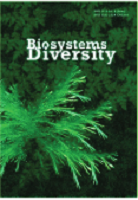Influence of ecological farming on the community structure of epigeic arthropods in crops Triticum aestivum and T. spelta
Influence of ecological farming on the community structure of epigeic arthropods in crops Triticum aestivum and T. spelta
Author(s): V. Langraf, K. Petrovičová, J. Schlarmannová, P. Cenke, V. V. BrygadyrenkoSubject(s): Energy and Environmental Studies, Environmental Geography, Environmental interactions
Published by: Дніпропетровський національний університет імені Олеся Гончара
Keywords: invertebrates; abundance; diversity; agroecosystems; ecotones; field margins.;
Summary/Abstract: Soil is an irreplaceable natural resource that enables the production of food and raw materials, forms agricultural and forest landscapes, filters and maintains water, ensures the cycle of substances in the ecosystem and contributes to maintaining biodiversity. Agricultural intensification is one of the most important factors for biodiversity loss. Spatial dispersion of epigeic arthropods reflects the ecological status of habitats and points to its quality. The aim of our research was to point out the differences in epigeic arthropod diversity in the examined crops Triticum aestivum, T. spelta and the influence of their ecotones on epigeic arthropods. Between the years 2019 to 2021 an investigation using the pitfall trap method recorded 5,232 individuals belonging to 13 taxonomic groups. The crop T. aestivum was represented by 2493 individuals and 13 taxa while in T. spelta we recorded 2739 individuals and 11 taxa. We observed significantly more taxa in the crop T. aestivum than in the crop T. spelta. We also confirmed the ecotone rule only for the T. aestivum crop. We confirmed the significant influence of crops and environmental variables (pH, potassium, phosphorus, nitrogen) on the spatial dispersion of individuals around pitfall traps. On the basis of our results, both ecological farming and their ecotone systems are important for epigeic arthropods and with topical and trophic conditions, which is important for the production of biomass and also affects crop. In any anthropogenic activity, it is important to give priority to less invasive procedures with non-toxic effects on organisms and to use effective technologies in land management.
Journal: Biosystems Diversity
- Issue Year: 30/2022
- Issue No: 3
- Page Range: 263-269
- Page Count: 7
- Language: English

